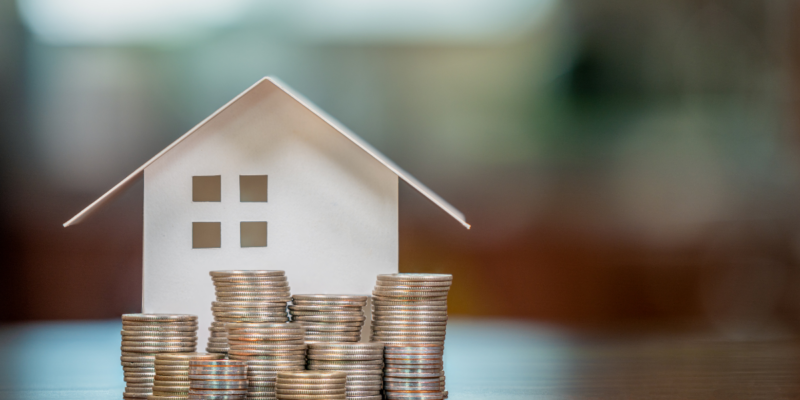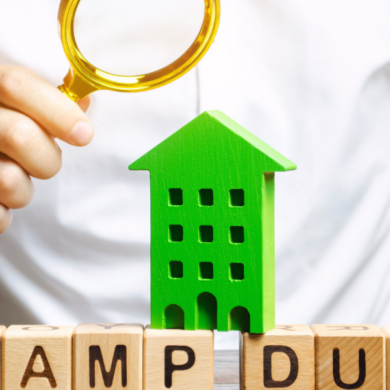
A home loan down payment is a percentage of the total cost of a home that a buyer pays upfront as a part of their loan. This amount is typically between 5% to 20% of the total cost. The purpose is to reduce the risk for the lender and to demonstrate the borrower’s ability to save & manage finances responsibly.
When a borrower makes a payment, they have more equity in the home from the outset, which can make the loan less risky for the lender. Additionally, borrowers who put down a larger amount may be eligible for lower interest rates, and may be more likely to get loan approval. A home loan down payment is important because it can reduce the cost of a loan, increase the borrower’s equity in the home, and make the loan less risky for the lender.
Table of Contents
What is a Home Loan Down Payment?
It is a portion of the purchase price of a property that a borrower pays upfront, before taking out a mortgage loan to finance the rest of the purchase. The deposit amount is typically expressed as a percentage of the home’s purchase price, with the remaining balance paid off through regular mortgage payments over the years.
Why is a Down Payment Important?
-
Lower Monthly Payments:
When you make a larger payment at the beginning, you reduce the amount of money you need to borrow to purchase a property, which reduces the monthly mortgage payments.
-
Lower Interest Rates:
It can also lower your interest rate. Lenders typically view borrowers who make a larger down payment as less risky, so they may offer them a lower interest rate.
-
Greater Equity:
The more money you put down on a property, the more equity you will have in that property. Equity is the difference between the value of the property and the amount of the mortgage loan you owe.
-
Improved Loan Terms:
When you make a larger payment upfront, you may be able to negotiate better loan terms, such as a lower interest rate, a shorter loan term, or lower foreclosure costs.
-
Reduced Risk for the Lender:
The initial payment shows that you are financially committed to the property and less likely to default on your mortgage payments.
Overall, a down payment is important because it can help you save money eventually, improve your loan terms, and reduce the risk for both you and your lender.
How Does the Down Payment Affect the Loan Amount and Interest Rates?
This is a crucial factor when it comes to obtaining a home loan, and can have a significant impact on the loan amount & interest rate.
A larger payment upfront reduces the loan amount and can result in a lower interest rate. This is because lenders consider a larger down payment as a lower risk, and are more willing to offer a lower interest rate. A smaller payment, on the other hand, increases the loan amount and can result in a higher interest rate. This is because lenders see smaller payments as risky, and may require the borrower to pay for private mortgage insurance (PMI) to protect the lender in case the borrower defaults on the loan.
To summarise, the down payment can affect the loan amount and interest rate in the following ways:
- A larger payment reduces the loan amount and can result in a lower interest rate
- A smaller payment increases the loan amount and can result in a higher interest rate
Must Read: Difference Between Fixed and Floating Interest Rate in Home Loan
What is the Minimum Down Payment Required for Home Loan?
This can vary depending on the specific loan program and the lender’s requirements. Here are some common minimum down payment requirements for several types of home loans:
-
Conventional Loans:
These typically require a minimum payment of 5% to 20% of the purchase price, depending on the borrower’s credit score, debt-to-income ratio, and other factors. Private mortgage insurance (PMI) may be required for borrowers who put down less than 20%.
-
FHA Loans:
These are government-backed loans that require a minimum down payment of 3.5% of the purchase price. Borrowers must also pay upfront and annual mortgage insurance premiums.
-
VA Loans:
These are available to eligible veterans and military service members, and require no down payment. However, borrowers may need to pay a funding fee, which can be financed into the loan.
It is important to note that these are general guidelines, and the specific requirements for a particular loan will depend on factors such as the borrower’s creditworthiness, loan amount, and the property’s location and value. It is always a good idea to speak with the lender to determine the specific payment requirements for the loan program you are interested in.
How to make Down Payments more Reasonable; and Their Pros and Cons
Buying a home can be one of the most significant investments you make in your lifetime. One of the biggest challenges for homebuyers is producing the payment upfront required by most lenders. While there is no one-size-fits-all approach to making a down payment more reasonable, here are some options to consider, along with their pros and cons:
-
Saving Up:
This is the most traditional option that requires discipline, time, and sacrifice – but is usually the most cost-effective option.
• Pros: You will not have to pay any interest on the down payment
• Cons: It may take a while to save up, and the amount required may be too high for some buyers
-
Government Programs:
Many of these offer low down payment options for homebuyers, for example FHA loans. These programs usually require a lower credit score, but the interest rates are often higher.
• Pros: You can get a home with a lower payment than a traditional mortgage
• Cons: You may end up paying more interest over time than if you had saved up for a higher down payment
-
Borrow from Family or Friends:
This depends on your equation with your near and dear ones
• Pros: You might not have to pay any interest or fees on the loan
• Cons: You may damage your relationship with loved ones if you are unable to pay them back on time
-
Tap into Retirement Savings:
• Pros: You will not have to pay a penalty for withdrawing the money
• Cons: You will have to pay taxes on the withdrawn amount, and you could be sacrificing your retirement savings
-
Assistance Programs:
Some cities and states offer down payment assistance programs that provide grants or loans to help homebuyers.
• Pros: You may not have to pay the loan back, and the interest rates may be lower than traditional loans
• Cons: These programs may have income restrictions, and there may be limited amount of funds available
While each option has its pros and cons, it is important to weigh them carefully and choose the one that aligns with your long-term financial goals.
Benefits of Paying Minimum and Higher Down Payment for Home Loan
The initial payment – the upfront amount that you pay towards the purchase price of the property – is a crucial part of buying a home with a mortgage loan.
Here are some benefits of paying a lower down payment for a home loan:
-
Easier to Qualify:
With a lower amount, you may be able to qualify for a mortgage loan easier, because you have to borrow less money from the lender
-
Preserve Cash:
By paying a smaller amount, you can preserve cash that you could use for other expenses such as moving costs or renovations or interior furnishing
-
Investment Opportunities:
If you invest the money that you would have otherwise used for a higher down payment, you could potentially earn higher returns
Benefits of Paying a Higher Amount
-
Lower Monthly Payments:
By paying a larger amount, you can reduce your monthly mortgage payments, which can provide you with more financial flexibility.
-
Lower Interest Rates:
When you pay a higher amount upfront, lenders may offer you a lower interest rate. This is because the lender will view you as less of a risk, because you have invested more of your own money in the property.
-
Equity:
When you make a higher payment, you immediately build equity in your home. Equity is the difference between the amount owed on your mortgage and the value of your house.
-
Lower Overall Cost:
A higher down payment can save you money over the life of the loan because you will have to pay less in interest charges.
It is important to carefully consider your options and consult with a financial professional to determine the best course of action for you.
Tips for Saving for a Down Payment
This can be a daunting task, but nevertheless an important step towards homeownership. Here are some tips to help you with the same:
-
Create a Budget:
Start by figuring out how much you can realistically afford to save each month. Look at your income, expenses, and debt to come up with a number that makes sense for you.
-
Cut back on Expenses:
Look for areas where you can cut back on expenses. This could include eating out less, cancelling subscriptions you do not use, and reducing your energy usage.
-
Set a Savings Goal:
Determine how much you need for a down payment and set a savings goal. This will help you stay motivated and on track.
-
Open a Separate Savings Account:
This account can be specifically earmarked for your down payment. This will help you keep your savings organised, and make it less tempting to dip into the money for other expenses.
-
Automate Your Savings:
Set up automatic transfers to your savings account on a regular basis. This will help you save consistently and make it easier to reach your savings goal.
-
Research Assistance Programs:
There may be programs available in your area that can help with your down payment. Do some research to see what is available and assess if you qualify.
Saving for the initial payment takes time and effort, but it is worth it in the end. With a little bit of planning and discipline, you can make your dream of homeownership a reality.
Must Read: Home Loan Process 2023: A Step-by-Step Guide to Getting Your Dream Home!
Conclusion
A home loan down payment is a crucial factor to consider when buying a house. While it may seem daunting to come up with a considerable sum of money, there are several ways to save for it, such as cutting expenses, increasing income, and taking advantage of government programs.
It is also important to research and compare loan options to find the best fit for your financial situation. A larger payment can lead to lower EMIs and overall savings eventually. By carefully planning and preparing for a home loan down payment, you can make your dream of owning a home a reality.
FAQs:
Will Banks give 100 percent home loan?
No, you cannot obtain a 100% house loan from any lender, including a bank or a housing financing business. (HFC). Lenders finance around 75%-90% of the property cost, with you bearing the remaining 10%-25%.
Can I get 90 percent home loan?
You will be unable to obtain a loan for the full purchase price of your home, as banks are not authorised to lend / finance the whole property value. However, under some conditions, you may be eligible for a 90% home loan. The Reserve Bank of India (RBI) has announced rules allowing home loans of up to 90% of the property value for loan amounts of ₹30 lakhs and less. However, there are other financial institutions apart from banks, that provide loans up to 90% – subject to their eligibility criteria.
How to do down payment for home?
There are several ways to finance your down payment for a home loan. These include building a dedicated savings account, utilising your savings so far, borrowing against insurance policies / PPF, or borrowing from family / acquaintances.
What is the down payment formula?
Different banks / financial institutions have different percentages of required down payment. If the property value is less than ₹10 lakh, the payment is 10% of the total value. Similarly, for properties that are valued in the range of ₹30-70 lakh, the payment is 20% of the total value. Lastly, if the property value exceeds ₹75 lakh, the payment is 30% of the total value.
How much is tax free on a home loan?
India's income tax act ensures that you can claim a tax deduction of up to ₹1.5 lakh per annum on payment of home loans and interest.
Can I take 2 home loans?
Yes. There is no law barring a person from availing multiple loans at the same time, but lenders will offer you the loan only if you meet the eligibility criteria – for example your repayment capability.














